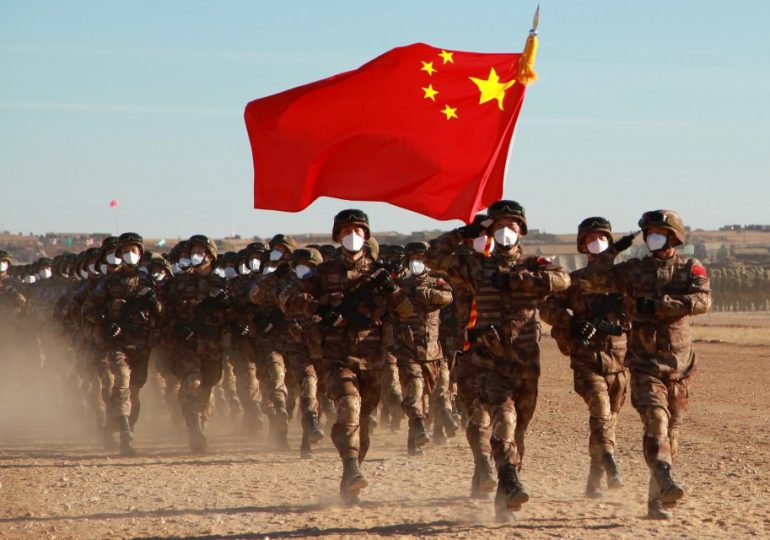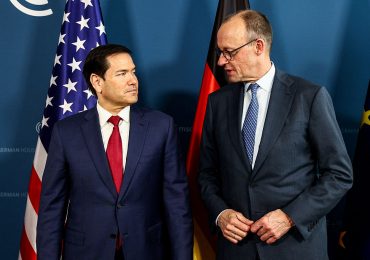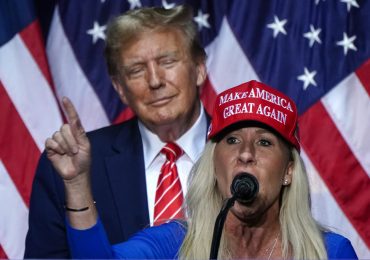WAR between China, Taiwan and the US could explode over one small “mistake” and result in a chilling new world order, experts warned.
Taiwan is bracing for its eighth presidential election – weeks after Xi delivered a chilling New Year message insisting “reunification of the motherland is inevitable”.
Chinese troops during a joint counter-terrorism military exercise in RussiaGetty
AFPTourists visiting the Triangle Fortress on Taiwan’s frontline island of Kinmen[/caption]
China regards the island as part of its territory – and has vowed to take the nation by force if necessary, carrying out ever more regular invasion rehearsals.
Taiwan insists it is an independent nation after splitting from mainland China in 1949.
Away from the conflict in Europe, the eyes of the world are nervously watching the boiling tensions between the two nations in East Asia.
As Taiwan’s voters head to the polls on Saturday, the looming threat of war is likely to be at the forefront of their minds.
Beijing has been increasingly flexing its military might – sending in fighter jets daily around the island, while its naval vessels have a near-constant presence around Taiwan’s waters.
Chinese officials have dubbed this election as a choice “between war and peace” – and this week warned the US it would “never back down” on the issue of Taiwan.
With its strategy of intimidation and daily harassment, China hopes to gradually wear Taiwan down.
But with increasing drills, incursions and threats, there are fears that one small “misunderstanding” could spark “uncontrolled escalation” – leading to all-out war, General Sir Richard Barrons warned.
The former head of Joint Forces said the greatest danger is “clumsy” sabre-rattling or a “hot-headed” military command pushing one side into starting a war.
Or it could be sparked by a “dramatic” clash between two jets, a ship sunk or an aircraft shot down – with decisions then driven by “red mist, not political logic”, he said.
“Clumsy rhetoric could push the other side into a corner where they act because they feel they have to respond to their own public opinion,” he told The Sun.
“Wars can start for really bad reasons.
“And that’s the greatest danger over Taiwan – even though everyone sees it would be catastrophic for the global economy and global security.
“With this sabre-rattling that goes on around Taiwan, it can result in an incident nobody wanted that leads to a process of escalation that people can’t control – because it’s driven by red mist, not political logic. That risk absolutely exists.
“Misunderstanding can lead to like huge escalation. It always relies on your opponent responding as you expected – and that’s never guaranteed.”
General Barrons explained how the US military is “not experienced in dealing with something as big and dangerous as China”.
“In an environment where there’s plenty of rhetoric and where there is no rational reason for going to war, you could have an incident with, for example, a hot-headed military command,” he said.
“It might just be a clash between two jets, or it might be a clash between a ship and a jet that results in something dramatic.
“That’s an aircraft shot down or a ship sunk which begins to force leadership into a corner. That’s the risk.
“If you look at what’s happened in in another circumstances in history between big powers, there’s an incident that just unlocks the steam, you end up in uncontrolled escalation.
“It’s a bit like the way the First World War started.”
With this sabre-rattling that goes on around Taiwan, it can result in an incident nobody wanted
General Sir Richard Barrons
Kerry Brown, the director of the Lau China Institute at King’s College London, told The Sun that being complacent about China imposing a blockade and clashing with the US would be “foolish”.
He said it’s “very possible” that the Democratic Progressive Party – who have been in power since 2016 – will be re-elected.
And if they do win, there is at least another four years of limited to zero dialogue with Beijing, Prof Brown said.
Without any dialogue between China and Taiwan, the chances of a misunderstanding spiralling into an all-out conflict only increases.
“At a time when so much misunderstanding could happen, where the stakes are so high, this is not a good position to be in,” he warned.
“Even if the DPP win, they need to devise ways to speak to Beijing.”
A war with Taiwan would in effect be a war between China and the US, Prof Brown said.
China has become increasingly angry over America’s friendly relations with Taiwan – and the tensions between the two superpowers is “only likely to make Beijing act irrationally”.
“It would pitch the two greatest economic powers in human history against each other,” Prof Brown explained.
“It would decimate the global supply chains because of tech reliance on high tech semiconductors from a single factor in Taiwan.
“It would create a new world order where the US and China were enemies, not just competitors.
“Normally, China knows the costs of this as well as everyone.
“But we have to remember that it would be the decision of one man in Beijing, Xi Jinping, if war were to happen.
“As with Putin, leaders can do things that are impetuous and against the advice of their advisers.
“So while war is definitely not inevitable, not is it impossible.”
Ruby Osman, senior China researcher at the Tony Blair Institute of Change, said it’s likely there will be a “spike” in war drills from China after the election – similar to when Nancy Pelosi visited Taiwan in August 2022.
But these types of war games can lead to accidental escalation, she warned.
“The thing that was worrying after Nancy Pelosi’s visit was that China cut off military-to-military communications with the US,” Ruby told The Sun.
“That’s really worrying as you have a lot of US ships in that area.
“If there’s a potential of something going wrong there and quickly escalating because you don’t have the channels to de-escalate, that’s worrying.
“In general, the risk of a misunderstanding that escalates is scary – and at a time when both China and the US don’t have a lot of room to back down.”
‘Surprise’ invasion
Many military analysts have laid out how a “surprise” invasion or a blockade would unfold if China decided to launch an all-out blitz to achieve its goal of “reunification”.
General Barrons said China is “almost certain” to do two things to prepare for war.
“One is that you’re never going to do is give notice that you’re going to invade Taiwan so that the US can get ready,” he said.
“You’re going to go for surprise, which means you can’t build an invasion force in China, because it will be seen.
“What you are actually going to do is to isolate Taiwan and that’s essentially a blockade.
“And a blockade would be digital, cyber and physical. But to try and keep it below the threshold where a conventional military response would be justified.
“When people talk about a Chinese invasion of Taiwan, and they still have D-Day in mind, but that is the least successful way of thinking about how you force Taiwan to reunite with China.
“Russia, for example, on February 22, thought that it could do an amphibious assault of Odessa and it would quickly work out.
“China can also see that a modern Taiwan military would make the cost of assault really high – even if you were successful in the end.”
As seen in Ukraine and Gaza, “the way war is fought is being changed by the fact the world is essentially transparent”, General Barrons said.
When people talk about a Chinese invasion of Taiwan, and they still have D-Day in mind, but that is the least successful way of thinking about how you force Taiwan to reunite with China
General Sir Richard Barrons
“You can’t organise an invasion on airfields and airports in China and not be seen – because of what you can see from the sky and open source data,” he explained.
“And then, when you launch a military invasion, the developing primacy of precision missiles means that your loss rate on ships and aircraft will be far more.
“If your opponent has got precision missiles and can see a target, they will cause enormous attrition.”
While General Barrons believes an invasion is unlikely in the next few years, he warned the world is “changing significantly” and it should not be ruled out.
“With the rise of China, there could be a time at some point in the future when a significant majority of the population of Taiwan felt that their security and their prosperity were better protected by reunification with China,” he said.
Based on China’s past drills, Ou Si-fu, an analyst at Taiwan’s Institute for National Defence and Security Research, said “it is most likely” China would use missile strikes to hit Taiwan’s military infrastructure.
He calls it the “decapitation” scenario, as the missile bombardments would hit Taiwan’s command centre, air force, naval bases, as well as its ammunition depots.
“When you cut off the political or military figures, then you cannot command the troops to defend (Taiwan),” Ou told AFP.
China could choose to seize Taiwan’s outlying islands of Kinmen and Matsu – both sitting around six miles off the coast of the mainland.
It could also attempt a full blockade of the entire Taiwan island, preventing anyone – or any shipments – from getting in and out.
In April last year, China’s People’s Liberation Army conducted three days of drills simulating a blockade of the island in response to then-US House speaker Kevin McCarthy meeting Taiwanese President Tsai Ing-wen in California.
“The PLA can execute blockades on our ports, airports, military facilities, and air and sea lines of communication, to achieve its operational goal of ‘grounding all aircraft and anchoring all vessels’,” Taiwan’s defence ministry warned in its 2023 report.
A blockade would cost the global economy “well over $2trillion” at minimum, according to Rhodium Group – a punishing impact not just for Taiwan, but also China.
“If Chinese President Xi Jinping makes good on his pledge to unify Taiwan with the mainland, his forces would have to occupy the island,” Ou said.
The risk of a misunderstanding that escalates is scary – and at a time when both China and the US don’t have a lot of room to back down
Ruby Osman
“To occupy Taiwan, they need to conduct an amphibious campaign.”
But amphibious assaults are complex and difficult – and Taiwan’s mountainous geography, coupled with its unforgiving monsoon weather conditions, is a deterrence.
But there are some vulnerable spots on the island – small, so-called “red beaches” that are suitable for a large-scale military landing.
One of the closest beaches to Taipei is in northern Taoyuan city – home to the island’s largest international airport.
“If (China’s PLA) occupy the airport, they can use it to transport their troops, their ammunition, their food,” Ou warned.
Taiwanese officials also fear China could launch a major cyberattack, knocking out the island’s key infrastructure such as communications, power and banking.
But Ruby believes a blockade is at least several years away – if at all.
“Xi takes a carrot and stick approach to Taiwan and sometimes we focus too much on the stick,” she said.
“But there’s a lot of thinking going on in Taiwan about what they can offer Taiwan and Taiwanese businesses that draw them closer to the mainland.
“You would ramp up the coercion such as military incursions and diplomatic isolation – but you would also sweeten the pot and offer incentives to Taiwan to come closer.
“You try to make it feel like the natural choice for Taiwan to move into China’s orbit.”
AlamyChinese president Xi Jinping has long threatened to take Taiwan by force[/caption]
AFPAnti-landing spikes on Taiwan’s frontline island of Little Kinmen[/caption]
Leave a comment








